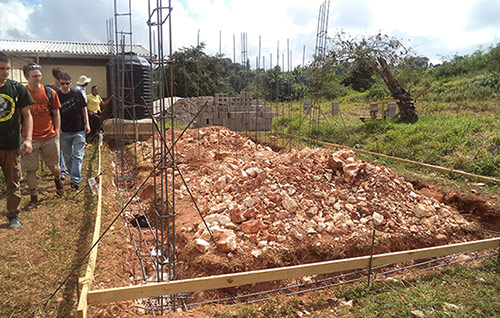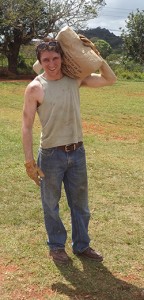Max Pridgen: Student Report from 2014 Alternative Spring Break in Jamaica

When we first landed, I was unsure of what to think. The humidity was high and I could feel my shirt sticking to my body as soon as I stepped off of the plane. It had been an uneventful plane ride, the kind that pilots must love to fly.
On the plane, I met a Kingston native who had answered to my many questions. I wondered, “This man shouldn’t be this quiet, he’s a Jamaican, right?” When we circled around the city of Kingston, I could see an enormous pit of fire in the middle of the moonlit city. Terry, my Jamaican plane mate, informed me that it was a garbage burning.
“Oh yes, it never goes out,” he said.
All of these images and sounds were conflicting with any of my former ideas about Jamaica. Where were the Rasta men and where was the reggae?
Walking through the Customs hallway was an experience in itself. Bombarded by advertisements for cellular service we had never heard of and tourists who didn’t speak our language, I had no idea what to think. We waited in Customs long enough to watch all of the rotating billboards go by a few times and made our way out to the airport entrance. As soon as we stepped outside, all of my previous ideas about Jamaica were reinvigorated. The palm trees, the tiny cars, the Usain Bolt signs; Jamaican culture sucked me in faster than I could notice.
After a quick drink of fresh coconut water, we stepped onto our bus. It was small, but adequate, with no seatbelts. All of us were tired from the trip, but none of us wanted to sleep. The city of Kingston flew by almost as fast as the night bus from Harry Potter. None of us were able to take in everything fast enough. In the middle of Sunday night, there were still plenty of people out in the city. Flashes of dance music would grace our bus as we flew by each place. It was a truly invigorating ride.
When we reached the city of Mandeville, the bus driver finally slowed down a bit and we were able to examine some of the houses better. Little by little, our group diminished in size as different people were let off at different host families’ homes around the city until only a few of us were left. So far, we had no idea what to expect, as each house had been completely different. Our driver dropped us off on the side of a hill. There was a car surrounded by grass and a basketball goal next to the driveway.
A large lady with short hair came to greet us at the gate. She reminded me of my grandmother. She introduced herself as Ontipí. Only later did I find out her name was actually Paulette and everyone calls her Auntie P. We all agreed that we couldn’t be in better hands. She asked us if we wanted any food, and we enthusiastically said yes. She went into her kitchen and wouldn’t accept any help from us. She returned with five dishes of food, enough for at least ten people. There was no way the four of us could finish it all. We graciously thanked her and tried to help clean up but she still wouldn’t let us. Auntie P. showed us our rooms, and all of us were immediately asleep.
We awoke to the sound of pouring rain against the palm trees. This rain came swiftly and left quickly, a weather theme we would grow accustomed to during the trip. After another enormous meal, we heard the horn of our taxicab. Auntie P. rushed us out to a short man wearing matching green hat and pants with a huge watch. This was our taxi driver. After piling into his car, we barreled through the city streets honking around blind corners, narrowly missing cars and pedestrians. This fast driving was how he made his money. We were delivered to the heart of downtown for our first tour. Our guides who were employees in the local Projects Abroad office showed us different landmarks of the city and how to find each of them.
We had lunch outdoors at a place called the “Right Choice” where some of the braver people in our group had fried goat. From here we visited our worksite, an elementary school on the outskirts of the city. Around 1:30 p.m., we reached the school. It was small and filled with many children. When we arrived, they were playing cricket in the yard and running around like hooligans. Their principal showed us their current bathroom, which wasn’t much more than a hole surrounded by cinder blocks. Clearly, they needed help building a new one. We met our project leader, a toothless tall Jamaican man of incredible strength named Percy. He described briefly the work we would be doing and graciously thanked us for our help.
After this, we were allowed to rest for the remainder of the day. When our group returned to Auntie P’s, there were already at least eight children playing around her house. Clearly her house was the place to be. She asked if I’d like to see the animals and we all wholeheartedly agreed. In the back of the house, which we hadn’t seen at all, there was a clothesline and a rain reservoir. (We would learn later that all of the drinking water came from the rain) I wanted to investigate more, but as soon as we had walked out, a chorus of barking dogs greeted us. They were all matted and dirty from living outside, but were incredibly friendly.
As soon as the dogs started barking, the rooster chimed in. We went farther up the hill and found the rooster and his mate pecking around in an enclosure. At the back of the concrete pen was another concrete wall. As soon as we looked over, a huge pig’s head came over the wall and begged us for some food. Auntie P had her own little farm that provided much of the food we ate while we were there. Meeting all of these animals was one of the most memorable experiences of the trip.

By the second day, we had already adjusted to the lifestyle. We were fed another huge meal and shipped off to work. Percy quickly gave us tasks, calling us by our appearance (beard guy, blonde girl) in an accent that only a few of us could understand. The trenches for the bathroom foundation had already been dug, so we started on the concrete. Everything in Jamaica was done by hand, including mixing the concrete. The recipe constantly changed, as Percy would decide that it was too watery or needed, “mor stoen.” The work was hot and sweaty, but rewarding. Our worksite included many other volunteers beyond the students from UT, so progress was fairly rapid. Around 2:00 p.m. we were done for the day and returned home. We were all exhausted and hot, so a cold shower and animal time at the farm was perfect.
The next two workdays were similar to the first and we made enough progress to build a quarter of a wall. This may not sound like much, as the foundation took two whole days to complete. This made us really appreciate the progress we could have made, had a cement mixer been available.
On the final day, we visited the Appleton Estate Distillery. This required riding in a bus crammed with all of the Projects Abroad visitors of that particular week. They provided us with some great tasting rum punch while we watched the tasting video. We learned that rum starts out as sugar cane. The cane is then crushed to extract the juice. This was originally done with a donkey drawn mechanical extractor; but the factory has since moved to more modern methods, which extract close to 95% of the juice. After this, the sugar cane is separated into solid sugar and molasses. The molasses is then fermented with yeast. After this, the product is distilled to increase the alcohol content and placed in oak barrels to age. After a period of years, the rum is removed form the barrels and blended to achieve the correct flavor. We had a great time during the tour and the tasting that followed.
After this, we were bussed over to YS Falls, a popular tourist spot in Jamaica. The group from UT had to return to the airport the next morning and we were bussed home.
I really enjoyed my experience. Many of the memories remain fresh in my mind. I can taste the humidity in the air and feel the culture surround me. Auntie P. called each of us individually when we returned home. I am so excited to visit Jamaica again.